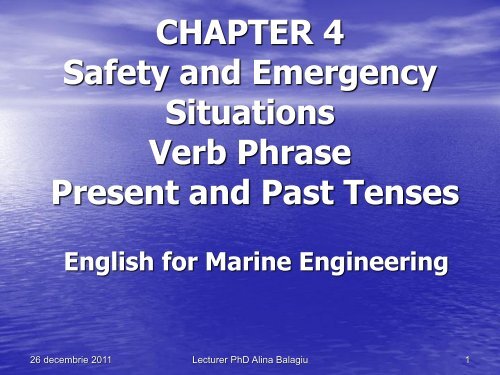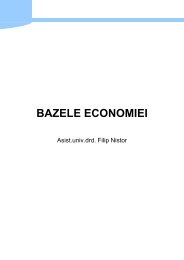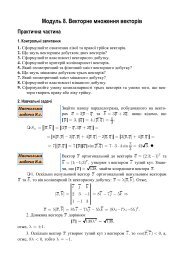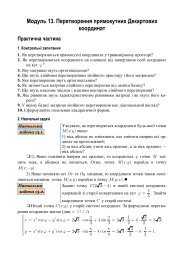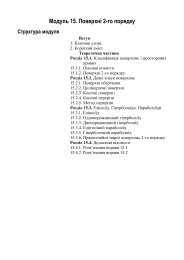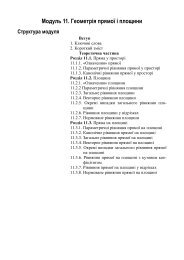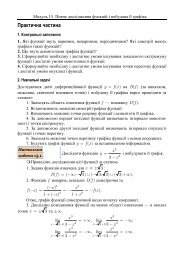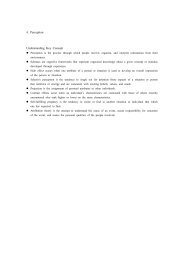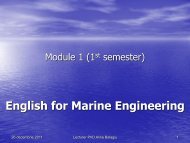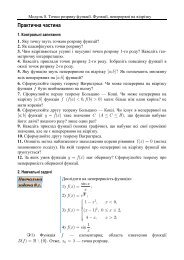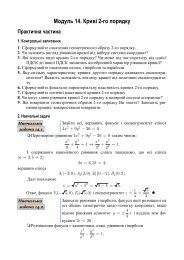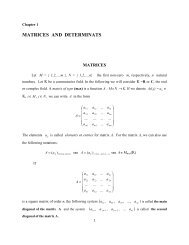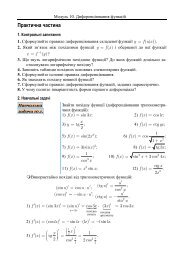Present Perfect Simple - Uuooidata.org
Present Perfect Simple - Uuooidata.org
Present Perfect Simple - Uuooidata.org
You also want an ePaper? Increase the reach of your titles
YUMPU automatically turns print PDFs into web optimized ePapers that Google loves.
CHAPTER 4Safety and EmergencySituationsVerb Phrase<strong>Present</strong> and Past TensesEnglish for Marine Engineering26 decembrie 2011Lecturer PhD Alina Balagiu 1
Content• Safety and Emergency SituationsVerb Phrase; <strong>Present</strong> <strong>Simple</strong> and Continuous• Alarms on Board; <strong>Present</strong> <strong>Perfect</strong> <strong>Simple</strong> andContinuous• Fire Fighting; Past <strong>Simple</strong> and Continuous• Medical Care; Past <strong>Perfect</strong> <strong>Simple</strong> andContinuous26 decembrie 2011 Lecturer PhD Alina Balagiu 2
Minimal Bibliography• Minea Alina, English for Marine Engineering,Coursebook, 1 st year of study, Mircea cel Batran NavalAcademy Publishing House, 2004, Unit 5, p 53-63;• Azar Betty Schrampfer, Understanding and UsingEnglish Grammar, Pearson Ed. NY, 1999 Cap.1,2;• Balagiu (Minea), A.; Lungu D., Astratinei C., Alibec C.,Zechia D., Cizer L., Ion A., Mates R, English GrammarPractice, Mircea cel Batran Naval Academy PublishingHouse, 2008, vol I, 84-128.26 decembrie 2011 Lecturer PhD Alina Balagiu 3
Safety and EmergencySituationsVerb PhraseEnglish for Marine Engineering26 decembrie 2011Lecturer PhD Alina Balagiu 4
Safety and Emergency SituationsVerb Phrase• Safety and Emergency Situations.– Safety on board.– Protection from fire• The verb phrase.– main verbs: give the meaning of the sentence;– auxiliary verbs: be, have, do, and modals: can, may, must etc;– action verbs: do, go, buy, play, take, say, ask, decide etc;– state verbs: believe, contain, depend, exist, hate, like, need etc.‣ <strong>Present</strong> <strong>Simple</strong>.• Form and use: He works hard every day.‣ <strong>Present</strong> Continuous/ Progressive.• Form and use: What are you doing?‣ <strong>Present</strong> <strong>Simple</strong> versus <strong>Present</strong> Continuous.26 decembrie 2011 Lecturer PhD Alina Balagiu 5
Fire protection and firefighting equipment• Protection equipment:– smoke and heat detectors;– fire-proof materials;– compartmentalisation;– smoking restrictions.• Fire fighting equipment:– sprinkler systems;– fire extinguishers;– well-trained fire-fighting personnel;– advanced fire-fighting equipment.26 decembrie 2011 Lecturer PhD Alina Balagiu 6
<strong>Present</strong> Continuous• Rules of adding –ing ending;– e - Ǿ write – writing• but be - being, age –ageing, dye – dyeing, singe -singeing– ee - ee flee – fleeing– Y - y cry - crying– ie - y lie - lying– c + v + c - c + v + cc sit – sitting• but develop – developing (the second syllable is stressed,listen – listening (vowel is not pronounced)26 decembrie 2011 Lecturer PhD Alina Balagiu 7
Exercises• 1. Exercise X. Put the verb in the present continuous (I am doing)or simple present (I do)1. Excuse me, do you speak …….. (you/ speak) English?2. Tom (is taking) …… (take) a shower at the moment.3. They don’t watch …. (not/ watch) television very often.4. Listen! Somebody …………….. (sing).5. She’s tired. She …………….. (want) to go home now.6. How often …………. (you/ read) the newspaper.7. “Excuse me, but you … (sit) in my place. ”Oh, I’m sorry.”8. I’m sorry, I …(not/understand). Please speak more slowly.9.“Where are you Dan?” “ I’m in the living room. I…. (read).”10. What time …………. (she/ finish) work every day?11. You can turn off the radio. I………….. (not /listen) to it.12. He… (not/ usually/drive) to work.. He usually ………… (walk).• 2. How is the ship protected if water comes in for any reason?26 decembrie 2011 Lecturer PhD Alina Balagiu 8
Alarms on Board;<strong>Present</strong> <strong>Perfect</strong> <strong>Simple</strong> and<strong>Present</strong> <strong>Perfect</strong> ContinuousEnglish for Marine Engineering26 decembrie 2011Lecturer PhD Alina Balagiu 9
Alarms on Board;<strong>Present</strong> <strong>Perfect</strong> <strong>Simple</strong> and<strong>Present</strong> <strong>Perfect</strong> Continuous• Alarms on Board.– alarm types;– usual phrases used when raising alarm.• <strong>Present</strong> <strong>Perfect</strong> <strong>Simple</strong>.– Form and use: I have lost the manual.• <strong>Present</strong> <strong>Perfect</strong> Continuous.– Form and use: How long have you been repairingthe pump?• <strong>Present</strong> <strong>Perfect</strong> <strong>Simple</strong> versus <strong>Present</strong> <strong>Perfect</strong>Continuous.26 decembrie 2011 Lecturer PhD Alina Balagiu 10
Alarms on Board• Different kinds of alarms on board a ship– a general emergency alarm;– the fire extinguishing alarm;– the watertight door-closing alarm;– the vessel’s rescue-boat crew will be notifiedby alarm over PA system;– when a helicopter is going to land on a ship,the alarm will be announced over the PAsystem;– the end of an emergency will be announcedover the public address system.26 decembrie 2011 Lecturer PhD Alina Balagiu 11
<strong>Present</strong> <strong>Perfect</strong> <strong>Simple</strong> vs.<strong>Present</strong> <strong>Perfect</strong> Continuous<strong>Present</strong> <strong>Perfect</strong> <strong>Simple</strong>Have/has + verb (pastparticiple)• I/you/we/they haveworked/done• He/she/it has worked/doneQuestion• Have I/you/we/ theyworked/done?• Has he/she/it worked/done?Negative• I/you/we/they haven’tworked/done• He/she/it hasn’t worked/done<strong>Present</strong> <strong>Perfect</strong> ContinuousHave/has + been + v-ing(present participle)• I/you/we/they have beenworking /doing• He/she/it has beenworking/doingQuestion• Have I/you/we/they beenworking/doing?• Has he/she/it beenworking/doing?Negative• I/you/we/they haven’t beenworking/doing• He/she/it hasn’t beenworking/doing26 decembrie 2011 Lecturer PhD Alina Balagiu 12
Fire FightingPast <strong>Simple</strong> and ContinuousEnglish for Marine Engineering26 decembrie 2011Lecturer PhD Alina Balagiu 14
Fire FightingPast <strong>Simple</strong> and Continuous• Fire Fighting.– Essential action for effective fire-fighting;– Types of fire extinguishers.• Past <strong>Simple</strong>.– Form and use: He went on voyage last month.• Past Continuous.– Form and use: I was keeping watch on the deck at this time yesterday.• Past <strong>Simple</strong> versus Past Continuous.• Past <strong>Simple</strong> and <strong>Present</strong> <strong>Perfect</strong> <strong>Simple</strong>26 decembrie 2011 Lecturer PhD Alina Balagiu 15
Adverbials of time used with the<strong>Present</strong> <strong>Perfect</strong> vs. Past <strong>Simple</strong><strong>Present</strong> <strong>Perfect</strong> <strong>Simple</strong>• yet;• so far;• since;• for;Past <strong>Simple</strong>• yesterday;• two days/ three weeks/four months/ five years/six decades/ sevencenturies ago;• last night/ week/ month/term/ decade/ century/millennium etc.26 decembrie 2011 Lecturer PhD Alina Balagiu 16
ExercisesChoose the correct form of the verbs: Past simple or PastContinuous• Thomas Edison (1) started/ was starting work on the railway when he wastwelve, selling newspapers and snacks. There were long periods withnothing for him to do so he (2) build/ was building himself a littlelaboratory in the luggage van where he could carry out experiments whenhe (3) didn’t/ wasn’t selling things to passengers. Another way that he (4)occupied/ was occupying himself was by reading. He joined a library and (5)read was reading every single book in it. One day, when he (6) waited/ waswaiting at a station he (7) noticed/ was noticing a small boy who (8) played/was playing by the track, unaware that a train (9) approached/ wasapproaching. Edison (10) ran/ was running out and (11) grabbed/ wasgrabbing the child just in time. The child’s father was so grateful that he (12)offered/ was offering to teach Edison to be a telegraph operator. Edisonaccepted the offer and soon he (13) had/ was having regular lessons. Aftera year, he was good enough to get a job in the telegraph office. Hecontinued to read and experiment, whenever he (14) had/ was having time.At twenty-one he (15) left/ was leaving the telegraph office to devote all histime to being an inventor. He (16) went/ was going on to invent the electriclight bulb, the phonograph and the movie camera.26 decembrie 2011 Lecturer PhD Alina Balagiu 17
Exercises• 1. Exercise IV. Read about Lisa’s journey to Madrid.Put the verbs in the correct form.Last Tuesday Lisa (1) (fly) flew from London to Madrid. She (2)(get)….up at six o’clock in the morning and (3) (have) a cup ofcoffee. At 6.30 she (4) (leave) home and (5) (drive) to theairport. When she (6) (arrive), she (7) (park) the car and then(8) (go) to the airport café where she (9) (have) breakfast.Then she (10) (go) through passport control and (11) (wait) forher flight. The plane (12) (depart) on time and (13) (arrive) inMadrid Finally she (14) (take) a taxi from the airport to herhotel in the centre of Madrid.• 2. Translate the following words and phrases intoyour language:electrical equipment; engine control room; fire control panel;fire equipment; fire extinguisher; Fire Station; fire team; firefighting;fire-fighting team; fire-sensitive area; flame detector;foam fire extinguisher; foam monitor; heat detector; liveelectrical equipment; muster; powder fire extinguisher; put out.26 decembrie 2011 Lecturer PhD Alina Balagiu 18
Medical CarePast <strong>Perfect</strong> <strong>Simple</strong> andPast <strong>Perfect</strong> ContinuousEnglish for Marine Engineering26 decembrie 2011Lecturer PhD Alina Balagiu 19
Medical Care; Past <strong>Perfect</strong> <strong>Simple</strong> and• Medical care.– Medical care;– Man overboard.Past <strong>Perfect</strong> Continuous• Past <strong>Perfect</strong> <strong>Simple</strong>.– Form and use : They had repaired the motors the previous day.• Past <strong>Perfect</strong> Continuous.– Form and use: He was tired because he had been working all day.• Past <strong>Perfect</strong> <strong>Simple</strong> versus Past <strong>Perfect</strong> Continuous.• Past <strong>Simple</strong> versus Past <strong>Perfect</strong> <strong>Simple</strong>26 decembrie 2011 Lecturer PhD Alina Balagiu 20
Action to be taken at scene of anaccident involving casualties• At a scene of an accident involving casualtiesyou should:– get a general view of the situation;– restore breathing and heart beat;– control bleeding;– remove poisons;– prevent further injury to the patient;– prevent shock.26 decembrie 2011 Lecturer PhD Alina Balagiu 21
ExercisesSupply reasonable previous cases in the past for theseconsequences, results, effects or interest. Use the Past <strong>Perfect</strong>and try to find more than one previous cause for each sentence.He gave his horse a lump of sugar…She asked me to repeat my name…We asked her to sing the song again…They called the boy Moses…Father tipped the waiter very well…The man was out of breath…I sent my watch to the watchmaker’s…Our visitor was very tired…It was very cold outside in the garden…We gave the patient first aid…We didn’t meet yesterday after all…I couldn’t eat the food at lunchtime…Peter didn’t know the answer to thequestion…John looked very smart at his sister’swedding…The tramp had a three days’ beard…The president arrived half an hourlate…We called a doctor…Peter wasn’t very happy when wemet him…The Colonel had great experience ofmen…The children were late for school…26 decembrie 2011 Lecturer PhD Alina Balagiu 22
Exercises• 1. Exercise V. Supply the <strong>Simple</strong> Past to show cause andimmediate effect or the Past <strong>Perfect</strong> to show previouscause. The <strong>Simple</strong> past expresses the later consequenceHe (press) the switch and the engine (start).Peter (f<strong>org</strong>et) to fill up with petrol so his car (stop) just outside the garage.We (not eat) much for breakfast so we (feel) hungry at lunchtime.John (not arrive) by seven thirty, so Mary (go) to the cinema alone.Mr. Smith (misunderstand) the question because he (not hear) it well.Professor Smith (heat) a metal bar and it (expand).His firm (give) him a better position last year because he (earn) it.As we (miss) the express from London we (travel) on a slow train.Our host (introduce) me to Mrs. Brown whom I (not meet) before.Peter (sunbathe) too long and (get) blisters on his back.• 2. What action should the watch-keeping officer take for“Man overboard”?26 decembrie 2011 Lecturer PhD Alina Balagiu 23


